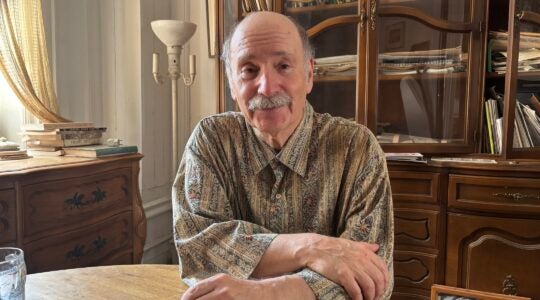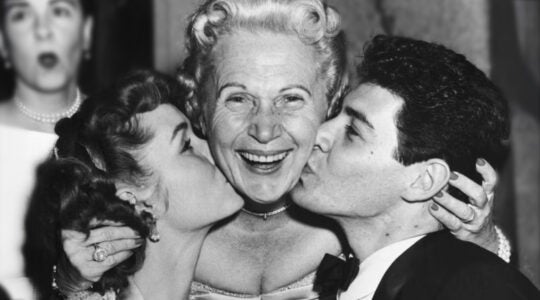Four months before Hadassah was to kick off a major fund-raising campaign for an emergency medical center in Jerusalem, at the beginning of 2002, 9-11 happened. The American economy crashed. Americans donated their shrinking amount of charity dollars to the terrorist attack’s relief effort.
"We were scared to death," says Joyce Rabin, Hadassah’s coordinator of development. Maybe the drive for the new hospital would fail.
Instead, the campaign’s initial $28 million goal was quickly met, a subsequent $18 million goal will be reached soon, and total contributions to Hadassah last year totaled $98 million, an 18 percent increase over the previous year.
"Our donors are passionate about Israel," Rabin says.
Hadassah isn’t alone.
Donations to the United States’ largest charities dropped in 2002, the first decrease in a dozen years, The Chronicle of Philanthropy reported last week: the average drop was 1.2 percent. But Jewish organizations were a major exception.
Money raised by Jewish groups represented in the chronicle’s ranking of the nation’s 400 biggest charities increased last year by 7.5 percent. Many of the Jewish groups, spurred by the ongoing Palestinian Arab violence in Israel, conducted emergency fund-raising campaigns last year.
"Emergency appeals for victims of terrorist attacks in Israel helped to increase fund raising at many Jewish federations," according to the Chronicle of Philanthropy. "Private support for the Jewish Federation Council of Greater Los Angeles (No. 184), for example, rose nearly 42 percent last year, to $75.6 million."
United Jewish Communities is the highest-ranking Jewish charity on the publication’s annual list; UJC raised $266 million last year, moving up from 41st place to 32nd. Second was UJA-Federation of New York, which climbed 17 places to 51st.
The highest-ranking charity with an entirely Israeli connection was American Friends of Bar-Ilan University, in 95th place, which raised more than $145 million.
"Despite a widespread sense that the notion of Jewish peoplehood is eroding, we see a fierce loyalty the Jewish community has to their brothers and sisters in Israel and abroad," says Mark Charendoff, president of the Jewish Funders Network.
The chronicle’s survey indicates that Jewish givers give when there is a crisis, Charendoff says: "even when there is a ‘positive’ crisis," such as "the chance to free Jews from the Soviet Union." But, he says, the 2002 figures "do not tell us anything about Jewish giving that is not crisis-driven. The crisis of continuity" (the Jewish community’s ability to sustain itself economically and spiritually) "is not perceived as a crisis."
Charendoff says donations to a wide variety of Israel-related causes rose last year in response to the sense of Israel being in crisis. "That includes federations, higher education in Israel, social welfare in Israel and other institutions in Israel."
Did giving to Jewish causes, arts and cultural institutions which ties to Israel also rise last year? The chronicle list did not answer that question, Charendoff says, adding, "My anecdotal sense is that it did not."
A survey of several Jewish causes indicates that Jewish fund-raising campaigns, fearful at first of losses after 9-11, adapted new approaches to counteract the perceived decline in giving.
"Last year we turned the campaign around," says Paul Kane, senior vice president of UJA-Federation. The annual fund-raising campaign, down at the start of the 2002 fiscal year, picked up midway and finished with a total of $250 million, Kane says.
"The initial burst came from Israel," he says: concern over the intifada and over its effect on Israeli citizens was translated into increased donations. UJA-Federation’s 2002 figure included $40 million for an Israel Emergency Fund.
"The Israel piece is what kicked Jewish philanthropy up a notch" across the country, Kane says. "People have responded incredibly": a record local delegation of 225 members will attend the UJC’s General Assembly next month in Jerusalem.
Kane adds that UJA-Federation also focused its campaign on local needs, taking potential donors on site visits to the agencies that receive funds from the philanthropy.
Donations to Jewish National Fund, which supports the planting of trees as well as building roads and other parts of the Israeli infrastructure, rose last year to $31 million, from $27 million, said Russell, executive vice president.
In addition to the monetary total, JNF added some 20,000 new donors to its rolls, Robinson says.
"We did not [exclusively] focus on the crisis" in Israel, instead also fund-raising on the traditional making-the-desert-bloom appeal, he says. He attributes the increase in JNF donations to a strengthened effort by the organization’s volunteers in local chapters. "We made an effort to get our lay leadership out there. They walked and talked the JNF story."
The chronicle reported that giving to international groups rose last year, while steep declines were recorded in contributions to arts and cultural organizations, and universities.
Joyce Rabin of Hadassah said the women’s Zionist organization, strongly identified with a pair of hospitals in Jerusalem, raised $98 million last year, an 18 percent increase over 2001. The campaign for the new emergency center "was a great motivator," she says.
Hadassah was very concerned after 9-11, Rabin says. "We heard from some of our donors that they planned to give locally," to the post-tragedy relief effort, possibly threatening Hadassah’s fund-raising.
A month after the attacks she attended a fund-raising event at a sukkah in Chicago. Eighty-four people packed into the sukkah, she says. The event raised $684,000. "I expected $100,000," Rabin says. "I was overwhelmed."
To offset the effects of 9-11 and the faltering economy, Hadassah stepped up its outreach to major donors, through e-mail messages about Hadassah activities and through newsletters, says Jane Karlin, director of development.
"We were afraid of losing donors to the compelling post-9-11 initiatives," Karlin says. The fear, in retrospect, was misplaced, she said, adding, "They gave to both."
The New York Jewish Week brings you the stories behind the headlines, keeping you connected to Jewish life in New York. Help sustain the reporting you trust by donating today.




